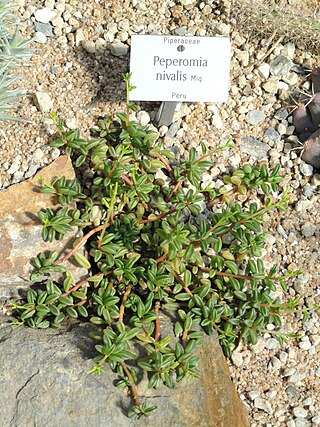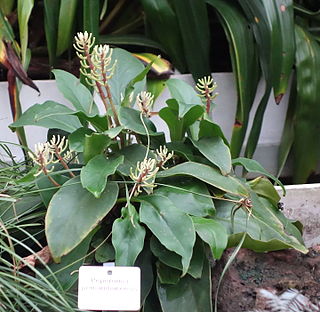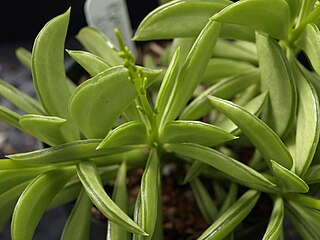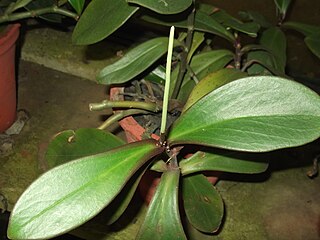
Peperomia is one of the two large genera of the family Piperaceae. It is estimated that there are at least over 1,000 species, occurring in all tropical and subtropical regions of the world. They are concentrated in northern South America and Central America, but are also found in Africa, southern Asia, and Oceania. The exact number is difficult to tell as some plants have been recorded several times with different names and new species continue to be discovered. Peperomias have adapted to many different environments and their appearance varies greatly. Some are epiphytes or lithophytes, and many are xerophytes (drought-tolerant) either with thick succulent structures or with underground tubers (geophytes). Most species are compact perennial shrubs or vines.

Allium canadense, the Canada onion, Canadian garlic, wild garlic, meadow garlic and wild onion is a perennial plant native to eastern North America from Texas to Florida to New Brunswick to Montana. The species is also cultivated in other regions as an ornamental and as a garden culinary herb. The plant is also reportedly naturalized in Cuba.

Peperomia graveolens is a species of plant in the genus Peperomia of the family Piperaceae. It is endemic to Ecuador.

Peperomia nivalis is a species of plant in the genus Peperomia endemic to Peru. Its native habitat is found in the high altitude ranges of the peruvian Andes. P. nivalis is a compact erect succulent herb with fleshy stems and leaves. The thick leaves are cuneate and U-shaped in cross-section with epidermal windows on the top-side. The leaf color is bright green in the shady summer and reddish during dry sunny seasons.

Peperomia tetraphylla, known as the acorn peperomia or four-leaved peperomia, is a small plant in the Peperomia genus and the Piperaceae family that grows natively in tropical and subtropical regions around the world. Additionally in can found on Easter Island as an introduced species.

Peperomia obtusifolia, also known as the baby rubberplant, American rubber plant, or pepper face, is a species of flowering plant in the genus Peperomia under the family Piperaceae, native to Florida, Mexico and the Caribbean. The specific epithet obtusifolia means "blunt-leaved". The plant has gained the Royal Horticultural Society's Award of Garden Merit.

Peperomia alata, commonly known as the winged peperomia, is a species of plant in the genus Peperomia of the family Piperaceae. Its native range covers most of tropical and subtropical America, from southern North America through West Indies and Central America to South America. It can also be found in Florida, although there it is apparently rare, known for certain only from swamps in Collier County.

Peperomia pernambucensis is a species of plant in the genus Peperomia in the family Piperaceae. Its native range is in Central and South America from Nicaragua to Bolivia.
The anthophytes are a grouping of plant taxa bearing flower-like reproductive structures. They were formerly thought to be a clade comprising plants bearing flower-like structures. The group contained the angiosperms - the extant flowering plants, such as roses and grasses - as well as the Gnetales and the extinct Bennettitales.
Peperomia velutina is a species of flowering plant in the family Piperaceae, native to Colombia and Ecuador. It has gained the Royal Horticultural Society's Award of Garden Merit as a terrarium or greenhouse ornamental.

Peperomia dolabriformis is a species of plant in the genus Peperomia in the family Piperaceae. The species is also known as prayer pepper. The plant is used as an ornamental houseplant. It is native to Ecuador and Peru.

Peperomia ferreyrae is a species of plant in the genus Peperomia native to Peru. It is a small, succulent herb, growing erect to about 20 cm in height. The alternating, typically 3 to 5 cm long leaves, are in the form of tubes resembling green bean pods: U-shaped in cross-section with epidermal windows on the top-side.

Peperomia nitida is a species of plant in the genus Peperomia. Its native range is in South America from Brazil to northern Argentina. It can be kept as a houseplant and is sometimes sold as cupid peperomia, or problematically as Peperomia scandens or Peperomia serpens. Peperomia serpens is a separate species with slightly more rounded leaves and its native region reaches further north to Mexico. The title scandens is occasionally applied to both, perhaps because both are vining plants, but officially Peperomia Scandens is considered a synonym for Peperomia serpens.

Peperomia clusiifolia is a species of plant in the genus Peperomia. It is endemic to Jamaica. It is commonly known as red edge peperomia because its leaf margins are tinged with dark red. There are varieties where this red or lighter colors are shown as striking variegation. These are typically sold under names such as P. clusiifolia 'Variegata', P. 'Jellie', or P. 'Tricolor'.

Peperomia magnoliifolia, commonly known as the spoonleaf peperomia, is a species of plant in the genus Peperomia. Its native range reaches from parts of southern Florida and Mexico to the Caribbean and northern South America including Uruguay.

Peperomia quadrangularis, commonly known as the beetle peperomia, is a species of plant in the genus Peperomia of the family Piperaceae. Its native range is in tropical America, including areas in northern South America, Central America and the West Indies.

Peperomia cookiana, is a species of plant in the genus Peperomia. It is endemic to Hawaiian Islands.
Peperomia quadrifolia is a species of plant in the genus Peperomia of the family Piperaceae. It is endemic to Central and South America.

Peperomia polybotrya, commonly known as raindrop peperomia or raindrop plant, is a species of perennial plant in the genus Peperomia of the family Piperaceae. It is native to Colombia, Ecuador, and Peru.

Peperomia orba is a species of plant in the genus Peperomia of the family Piperaceae.

















